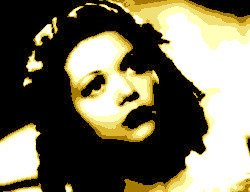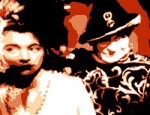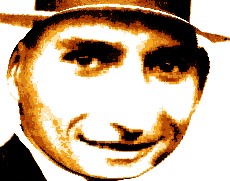Film Review
Immediately after
Les Otages (1938), director
Raymond Bernard and dramatist Jean Anouilh teamed up for another film
with an existentialist underpinning, albeit in a somewhat more
tongue-in-cheek vein. Influenced no doubt by Jean-Paul Sartre and
Albert Camus, the question of free will was one that Anouilh took a
great deal of interest in around this time, and it impinges on much of
his work (films and plays) of the 1940s.
Cavalcade d'amour is interesting
not only because of its existentialist associations - demonstrated by
the inability of successive generations to marry for the right reasons
- but also because it is one of the earliest examples of the
portmanteau anthology film, consisting of self-contained stories linked
by a common theme. This kind of film was comparatively rare in
the 1930s and 40s, but became very popular in France in the 1950s and
60s.
In
Cavalcade d'amour, the
three similar stories (taking place in the same location, in three
different periods in history) have in common Michel Simon and Claude
Dauphin, who both have tremendous fun delineating their three distinct
characters. Raymond Bernard appears to have given Simon free rein
to indulge his comic excesses, particularly in the first segment where
he hams things up to an outrageous degree as the hammiest of itinerant
actors (to be fair, the style of acting in the 1600s was not what you
would ever call
naturalistic).
Even as a 19th century prelate, Simon is still hilarious, and as a
1930s capitalist he brims with mischief. Dauphin is the lucky
fellow who, throughout history, attracts the finest examples of female
pulchritude as easily as a magnet collects pins. After a
dalliance with Janine Darcey ends in a nasty spot of pre-Revolution
mutilation, Dauphin jumps forward two hundred years and ends up being
torn between Blanchette Brunoy and Simone Simon (last seen together in
Jean Renoir's
La Bête humaine).
Despite her ethereal beauty and obvious sex appeal, Mlle Simon gets the thumbs down and this
may be why she cleared off to Hollywood and ended up in such films as
Cat
People (1942) and
Curse of the Cat People
(1944). With two amorous mishaps to his name, Daupin looks set to
complete the hat trick one century on with Corinne Luchaire, but
thankfully the fates, or rather the vagaries of the stock market,
intervene to prevent the film ending on a downer.
Cavalcade d'amour may not be
Raymond Bernard's greatest work but it demonstrates the director's
flair for storytelling and his remarkable versatility in a film that
encompasses the extremes of drama and comedy. The production
design is excellent, each of the three time periods vividly represented
by some superb set design and differing styles of lighting. The
first segment, a fairytale set in the 17th century, bleakly anticipates
its nightmarish ending with its shadowy castle interiors and some
grotesque imagery. By contrast, the 1800s are illustrated by a
conspicuous elegance that positively breathes the perfumed essence of
the romantic era. For the 20th century segment, the château
location acquires an Art Deco makeover that reflects the power of its
latest occupant, and also the sad sterility of his unfulfilled
life. Creating a template for future portmanteau films, Raymond
Bernard succeeds in giving each of his three stories a separate
identity, whilst at the same time bringing them together to form an
intensely satisfying triptych.
© James Travers 2015
The above content is owned by frenchfilms.org and must not be copied.
Next Raymond Bernard film:
Un ami viendra ce soir (1946)
Film Synopsis
For hundreds of years, the château de Maupré has brought
misfortune to its inhabitants, as those who choose to wed within its
walls are destined to wed unhappily. In 1639, Julie de
Maupré is to marry a man she has never seen but before she meets
her future husband she falls in love with Léandre, a handsome
young actor with a company of travelling players. Julie is
horrified to find that her chosen husband is a misshapen brute, but her
attempt to elope with Léandre ends in tragedy. Two
centuries on, preparations are under way for the marriage of Count
Hubert to his cousin Léonie. Juliette, a young dressmaker
from Paris, falls madly in love with Hubert as soon as she sees him,
and he seems to reciprocate her feelings. Alas, Juliette does not
belong to Hubert's privileged world and she dies from a broken heart as
the marriage proceeds as planned. In 1939, Monsieur Lacouret, a
successful financier, intends that his daughter Junie should marry into
an impoverished aristocratic family, the Dupont-Duforts. Even
though Junie gets on well with her intended husband Georges, the two
young people know that neither can consent to an arranged
marriage. Only by losing his entire fortune will Lacouret succeed
in bringing off the match, the couple marrying for love, not personal
advantage.
© James Travers
The above content is owned by frenchfilms.org and must not be copied.



